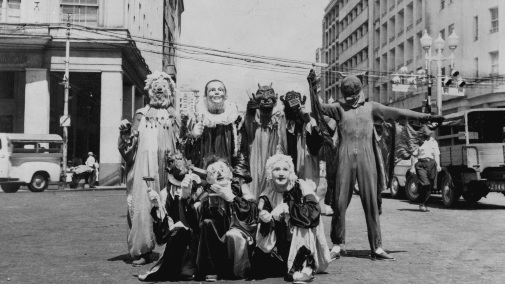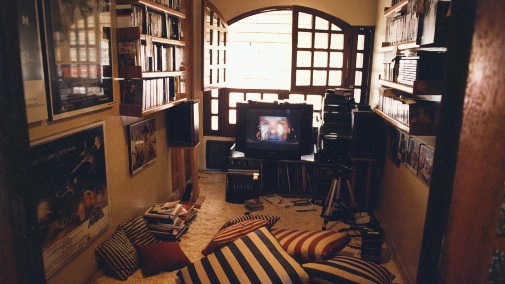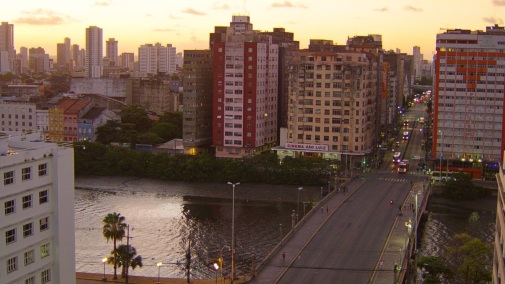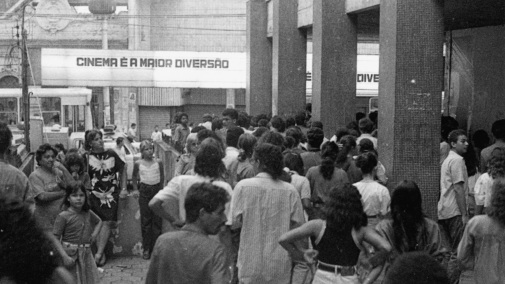TIFF '23: "Pictures of Ghosts" Sings a City Symphony
 Monday, September 11, 2023 at 9:33PM
Monday, September 11, 2023 at 9:33PM 
When I walk around Lisbon, I often pass by places that once were cinemas, temples of art and communion left abandoned or transformed for new commercial purposes. There's a big one that got bought by an Evangelical church years ago, its screening room turned auditorium for religious spectacle. I've witnessed some of these changes, but many had already happened by the time I found myself alone in the city. My parents' memories and souvenirs tell the stories of a metropolis I never knew, invoking ghostly cinemas I wish I had seen. Lisbon is a graveyard for a moribund culture, the moving image surviving in a few palaces that persist, raging against the dying of the light.
While watching Kleber Mendonça Filho's Pictures of Ghosts, I couldn't help but translate its reflections to my beloved Lisbon. I imagine most cinephiles will do the same for their homes. It's an identification that shouldn't betray the Brazilian master's intent, which is deeply personal. But in specificity, the universal resides...

Pictures of Ghosts is Kleber Mendonça Filho's version of a city symphony, singing an elegy for Recife, the place he grew up. For fans of the director, this documentary also serves as a companion piece to his former works, Neighboring Sounds most of all. Split into three chapters, the new flick peruses the origin of many of that 2013 movie's ideas, building up the streets where he came of age as the Genesis of his cinema. Most of all, the first portion of Pictures of Ghosts examines the universe enclosed by the walls that witnessed the filmmaker's childhood and present life, the kingdom of his dear departed mother turned into her son's home.
Back in Neighboring Sounds, it played the role of Bia's house, with the dog next door acting as a version of itself, complete with the constant barking that scored many residents' lives. The fate of that animal's abode inspired Aquarius' termite-infested ending, another connection in his filmography. But of course, Pictures of Ghosts' value is more than that of a making-of featurette. Rather than solely presenting the story of his cinema, Mendonça Filho offers a window into his family history, clarifying how a filmography can become self-portraiture by multiple means.
Fittingly, the auteur narrates the new picture and even appears in front of the camera, first in archival footage, then in a fiction Russian-dolled into fact. He's using himself as the prism through which the audience meets Recife, the proper subject of this ghostly picture. His camera is keen to dig out memories in forgotten spaces, derelict roads -- every ruin has a story to tell. When we're in the family house, cameras from the past come into play, old home movies bleeding into new video, excerpts from films, amateur and professional, falling into a kaleidoscope swirl of remembrance that should feel busy but instead flows smoothly.

We dance through these personal associations in an existence marked by constant change. We ricochet between architectural and social lines that are both urban and poetic, sometimes inching toward earned sentimentality. Traveling beyond home and mother, to surrounding structures like neighbor apartments, fences, dark roads, and new buildings onlooking the old ones, we come to a second chapter downtown where the cinemas used to be. Mendonça Filho starts a historical lesson, exposing archives and WWII history. Still, the intimate verve of his memories overtakes public information, branding every location with his own POV.
Recalling a projectionist friend, the documentary surges into one of its sorrowful peaks, a theater's downfall in rhyme with its workers' lives. Later, the man's old projector is found, a piece of junk with a universe of meaning for those who know where to look. The third chapter provides an epilogue-like point of divergence that leaves you wondering if Pictures of Ghosts will continue its metamorphosis even after the credits roll and the screening room empties.
I won't spoil that closing paroxysm of imagination; it's a delight you should discover free of expectation. Indeed, the portrait picture thrives in the engagement of ideas free of preconceived notions. Surrender to the film, and you'll observe an artist engaging with his past and place, his growth as both a person and a creator. Pay attention, and you'll be invited to do much the same, obliquely led by Kleber Mendonça Filho's example, in this his most tender and achingly intimate film. It's an inspiring experience altogether, the kind that will confirm your passion for the seventh art. See it on the biggest screen you can find.

Grasshopper Films will distribute Pictures of Ghosts in the USA, aiming for a 2024 release.


